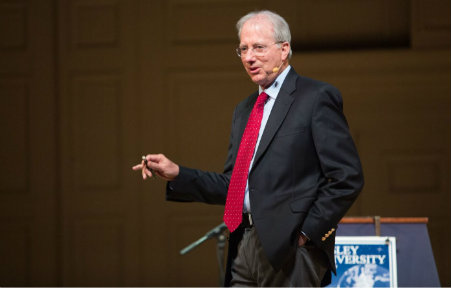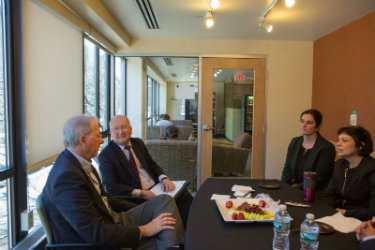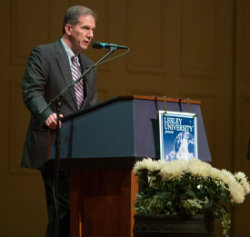Brokering peace agreements after centuries of enmity isn’t all fun and games — unless one of the combatants turns out to be a huge fan of the “Golden Girls.”

Ambassador Dennis Ross at the Boston Speakers Series.
With a deliberate, pacing style of a professor, and the pleasant demeanor of a neighbor who never hesitates to lend you his landscaping tools, former ambassador Dennis Ross provided anecdotes and advice related to the Middle East in Boston’s Symphony Hall on April 13. Ross, who worked under two presidents and has advised others, was the final speaker of the 2015-16 season of Lesley University’s Boston Speakers Series.
Ross’s Symphony Hall lecture followed an early-afternoon visit to Lesley’s Doble Campus, where he spoke to students, faculty and staff.
The life of the diplomat is one that involves careful, respectful conversations with world leaders, most of them zealous, intractable and occasionally erratic.
And sometimes the diplomat needs to act in an erratic fashion, too.
Ross wryly revealed that the foundation of the Hebron Accord of 1997 just might have been when, to show his frustration with Palestine Liberation Organization leader Yasser Arafat’s recalcitrance, he flung his binder of documents across the room, obliterating a pitcher of grapefruit juice.
But that wasn’t the most bizarre aspect of his encounter with Arafat. During one visit, he was surprised to find the revolutionary potentate, a man vilified by U.S. leaders as a fomenter of terrorism, transfixed to the television airing the “Golden Girls,” a Borscht-belt-style, rejoinder-heavy situation comedy featuring four tart-tongued senior women.
Dennis Ross, author of “Doomed to Succeed: The US-Israel Relationship from Truman to Obama” and “The Missing Peace,” showed himself adroit at delivering one-liners, as well. Having worked as a diplomat under both presidents George H.W. Bush and Bill Clinton, he was asked how he could work for standard bearers of opposing political parties.
“I spent 30 years talking with Arabs and Israelis,” he said, adding that brokering peace in today’s Congress might be more daunting than any tensions he allayed in the Middle East.
However, Ross underscored the seriousness of the challenges of global diplomacy. With a map of the Middle East displayed on a large video screen behind him, Ross used a laser pointer to highlight longtime trouble spots. He invoked the memory of T.E. Lawrence, comparing his plan for the Middle East to today’s regional boundaries, largely a holdover of the Sykes-Picot agreement following the defeat of the Ottoman Empire after World War I.

Ambassador Dennis Ross. Left, visited Lesley's Doble Campus.
“Lawrence of Arabia’s” boundaries were based on “tribe, sect and clan,” as opposed to the spheres of influence concocted by the United Kingdom and France, with Russia’s OK. While today those demarcations might seem more sensible, implementing them now after so much history would be sure to spark a calamitous war, dwarfing even present-day hostilities, Ross indicated.
As it is, Syria seems likely to end up partitioned along sectarian lines.
“To use a diplomatic term, you have a mess,” Ross quipped.
Inflaming an already tense area of the world, with profound implications for the West, is the emergence of the radical Islamist terror organization ISIS.
“We have to set them back,” Ross said, explaining that the Islamic State takeover of Mosul and other high-profile victories in Iraq have succeeded in giving the organization the notoriety and sense of invincibility needed to win adherents.
Though 1,000 ISIS fighters were able to overrun 30,000 Iraqi troops to take Mosul, Ross said those latter troops were a product of corrupt governments and were viewed by Iraqis as more of an occupying force than a legitimate military. Still, ISIS is in control of major Iraqi cities, so their recent losses aren’t yet enough to remove their mystique and influence. To truly pin ISIS down, the United States must aid and support the Sunni Muslims in taking back their region. Ross suggested there needs to be a resurgence of American power in the region, yet the 35,000 troops we have there haven’t been given the authority to bring their military might to bear.
America is hampered, he said, by President Barack Obama’s understandable disdain for entering into another prolonged quagmire as in Iraq. “I’ve said he has over-learned the lessons of Iraq.”
However, this isn’t the first time Washington has defanged the American military, Ross said, alluding to President Ronald Reagan pulling the marines out of Lebanon in 1984, and President Richard Nixon’s 1969 decision to withdraw from Libya’s Wheelus Air Force Base, a move that ended up strengthening the new, revolutionary government of Muammar Gaddafi.
Adding to the challenge is ISIS’s view of themselves as agents of the end times and an era of conservative, Islamist hegemony.
“They believe they need to bring their fight everywhere because they need to create a cataclysm,” Ross said. “They attack outside the Middle East because they see it as part of their mission.”
And, when it comes to the threat of ISIS, Ross said, “We don’t have the luxury of doing nothing.”
Speakers series finale

President joseph Moore
As Ross’s address marked the season finale for Lesley University’s Boston Speakers Series, the evening also featured a few moments to recognize other endings, too.
Lesley President Joseph Moore, retiring at the end of June, concludes his official role hosting the series.
Similarly, moderator Phil Redo of WGBH — Lesley’s media partner for the series — is stepping away from his Symphony Hall duties. The moderating tasks will be taken over next season by Jared Bowen, host of WGBH-TV’s “Open Studio” program.